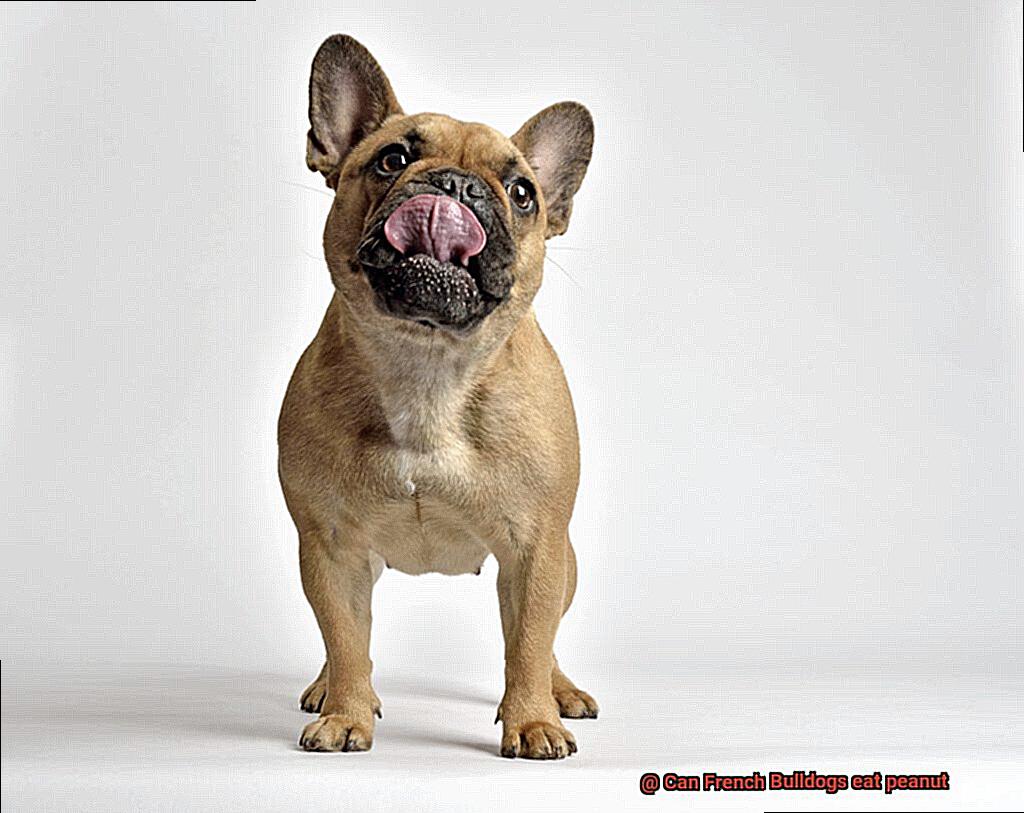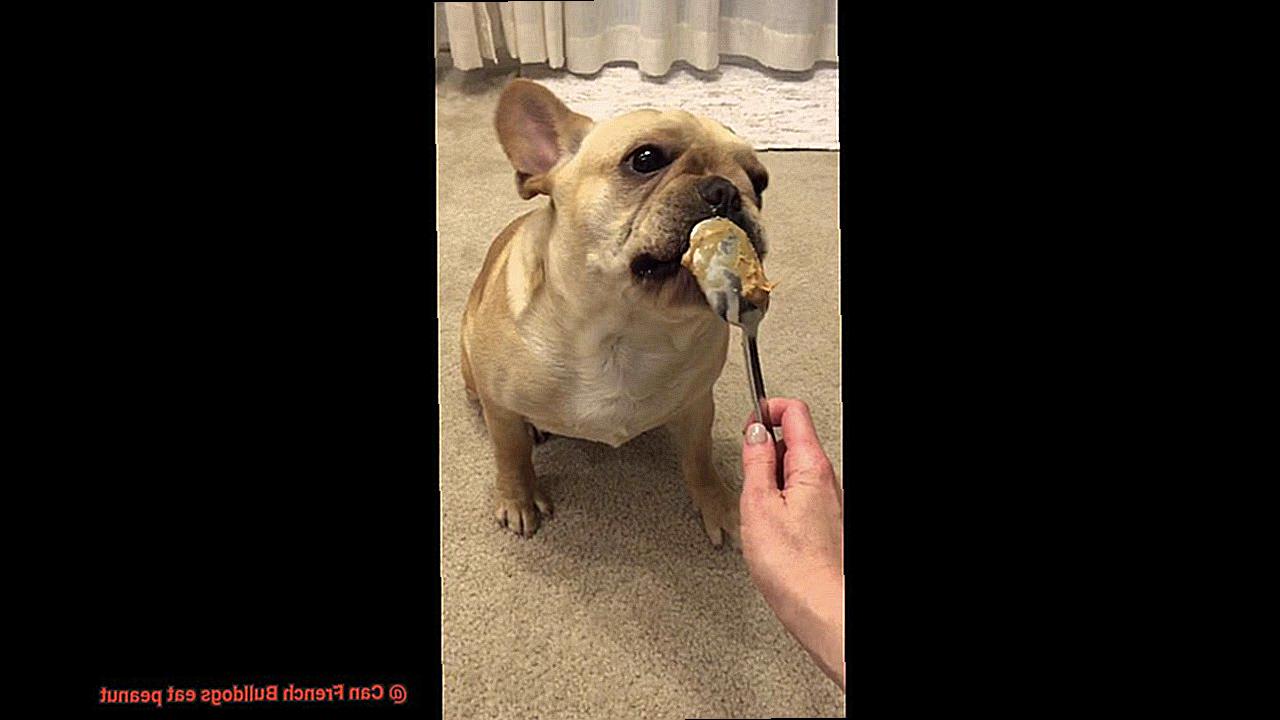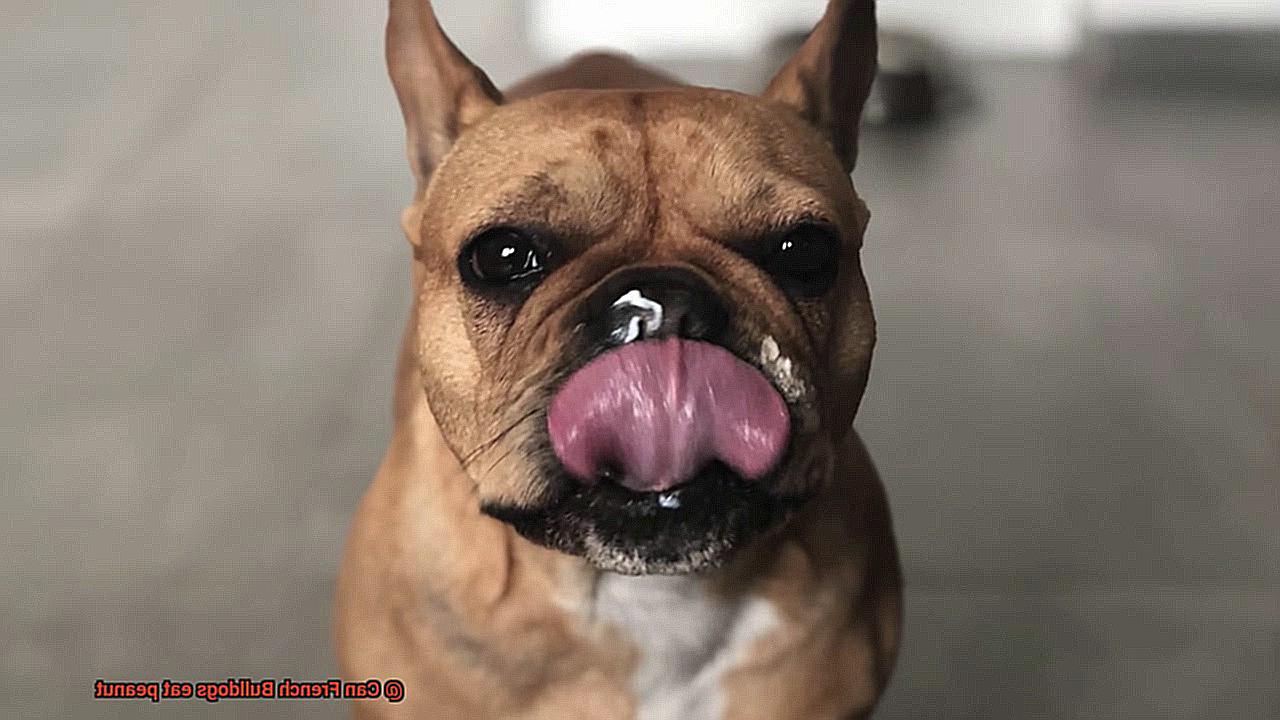Can French Bulldogs eat peanut?
We all know that our furry friends are a breed apart – with their quirky ears and snorty snuffles, they’ve got personality to spare. But when it comes to food, do French Bulldogs have a taste for the nutty goodness of peanuts? That’s the question we’re tackling today.
Now, you might be thinking, “What’s the big deal? It’s just a peanut.” Well, hold onto your hats because it turns out that what seems like a harmless snack could actually have some consequences for our precious pups. So, if you’re curious about whether your French Bulldog can safely enjoy this popular treat, buckle up and get ready for some enlightening insights.
We’ll be diving into everything from potential health benefits to potential pitfalls when it comes to feeding peanuts to our four-legged companions. So grab yourself a handful of peanuts (or maybe another snack if you’re not into nuts) and let’s uncover the truth about French Bulldogs and their love affair with these little legumes.
Nutritional Benefits of Feeding Peanuts to French Bulldogs
Contents
- 1 Nutritional Benefits of Feeding Peanuts to French Bulldogs
- 2 Potential Allergies and Adverse Reactions to Peanuts in French Bulldogs
- 3 Choking Hazards of Feeding Peanuts to French Bulldogs
- 4 Moderation Is Key: How Much Peanut Can a French Bulldog Have?
- 5 Alternatives to Feeding Peanuts to French Bulldogs
- 6 The Role of Veterinary Care When Introducing New Foods to Your French Bulldog’s Diet
- 7 Tips for Feeding Peanuts Safely and Effectively to Your French Bulldog
- 8 Conclusion
We all want the best for our furry friends, and that includes providing them with a healthy and balanced diet. Have you ever considered adding peanuts to your French Bulldog’s mealtime repertoire? Well, you’re in luck. In this blog post, we’ll explore the nutritional benefits of feeding peanuts to French Bulldogs and how they can contribute to their overall health and well-being.
Protein-packed goodness:
Protein is essential for the growth and development of your French Bulldog. It helps build strong muscles, repair tissues, and support a healthy immune system. Peanuts are a fantastic source of protein that can provide your pup with the fuel they need to stay active and playful.
Healthy fats for a shiny coat:
French Bulldogs are known for their sleek coats, and guess what? Peanuts can help maintain that shine. These legumes contain healthy fats like monounsaturated and polyunsaturated fats, which promote a healthy coat and skin. Plus, these fats aid in the absorption of fat-soluble vitamins, ensuring your Frenchie gets all the nutrients they need.
Vitamin and mineral powerhouse:

Peanuts are packed with vitamins and minerals that are vital for your French Bulldog’s well-being. They contain vitamin E, which acts as an antioxidant and supports healthy cells. Additionally, peanuts provide B vitamins like niacin, thiamine, and folate, which are essential for energy production and maintaining a healthy nervous system.
Fiber for good digestion:
Nobody likes tummy troubles, especially our four-legged friends. Peanuts are rich in dietary fiber, which aids in digestion and can help prevent constipation in French Bulldogs. Fiber also keeps them feeling fuller for longer, which can be beneficial for weight management.
Antioxidant superheroes:
Peanuts contain antioxidants like resveratrol and flavonoids, which have been linked to various health benefits. These antioxidants protect your French Bulldog’s cells from damage caused by free radicals and may even have anti-inflammatory properties.
Conclusion:

Feeding peanuts to your French Bulldog can be a great way to enhance their diet with valuable nutrients. However, it’s important to remember that moderation is key. Peanuts should be offered as a treat or supplement rather than a primary food source. Always consult with your veterinarian before introducing new foods into your Frenchie’s diet, especially if they have any known allergies or sensitivities.
Potential Allergies and Adverse Reactions to Peanuts in French Bulldogs
Potential Allergies and Adverse Reactions to Peanuts in French Bulldogs
As loving owners of French Bulldogs, we want the best for our furry friends. That means being aware of potential allergies and adverse reactions they may have to certain foods, including peanuts. While not all French Bulldogs will be allergic to peanuts, it’s important to be knowledgeable about the possible risks and take necessary precautions.
Signs of Allergic Reactions to Peanuts
Allergies to peanuts in French Bulldogs can manifest in various ways. Keep an eye out for these common signs:
- Skin irritations: Look for redness, rashes, or itching on your dog’s skin.
- Digestive issues: Vomiting and diarrhea may occur after consuming peanuts.
- Respiratory problems: In severe cases, your French Bulldog may have difficulty breathing.
Understanding the Protein Responsible for Allergies
Ara h1, a protein found in peanuts, is the main culprit behind allergic reactions. This protein triggers allergies in both humans and dogs. If your French Bulldog has a hypersensitivity to Ara h1, they may experience severe allergic reactions when exposed to peanuts.
Precautions and Recommendations
To prevent potential allergies or adverse reactions, follow these guidelines:
- Introduce new foods gradually: When introducing peanuts or any new food into your French Bulldog’s diet, do so slowly and monitor their reactions closely.
- Consult with a veterinarian: If you suspect that your French Bulldog has a peanut allergy or is experiencing adverse reactions after consuming peanuts, seek professional advice from a veterinarian. They can perform tests to confirm the allergy and provide guidance on managing it.
- Opt for alternatives: In some cases, veterinarians may recommend avoiding peanuts altogether and opting for alternative treats or food options that do not contain peanuts.
- Be vigilant: Peanut allergies can develop over time, even if your French Bulldog has previously tolerated peanuts without any issues. Stay observant and watch for any changes in their reactions to foods containing peanuts.
Feeding Peanuts Safely
If you choose to feed your French Bulldog peanuts, here are some tips to keep in mind:
- Moderation is key: Offer peanuts in moderation to prevent overconsumption.
- Plain and unsalted: Only give your French Bulldog plain, unsalted peanuts. Flavored or salted peanuts may contain additives and ingredients that can be harmful to your dog.
Choking Hazards of Feeding Peanuts to French Bulldogs
French Bulldogs are adorable little companions with big personalities, but when it comes to feeding them peanuts, we need to be aware of the potential choking hazards. These small and brachycephalic (flat-faced) dogs have unique anatomical features that can make it difficult for them to chew and swallow certain foods, including peanuts. Let’s take a closer look at the risks and how we can keep our Frenchies safe.
Size Matters
French Bulldogs are petite in size, and so are their throats. Peanuts, with their hard and dense texture, can easily get lodged in their throat, leading to choking or even airway obstruction. Imagine the panic of your furry friend struggling to breathe. To prevent this, it’s essential to avoid giving whole peanuts to your French Bulldog.
Gulp It Down
French Bulldogs have a tendency to gulp their food quickly, without taking the time to properly chew. This fast-paced eating style increases the risk of choking on whole peanuts or large pieces. To minimize this risk, consider chopping peanuts into smaller pieces or crushing them before offering them as a treat.
Peanut Butter Predicament
Peanut butter is a popular peanut-based treat among dog owners, but it can also pose a choking hazard if given in large amounts or if your Frenchie tries to eat it too quickly. The sticky consistency can make it challenging for them to swallow properly. If you decide to give your French Bulldog peanut butter as an occasional treat, ensure it is offered in small amounts and mixed into their regular food.
Take a look at this table summarizing the choking hazards associated with feeding peanuts to French Bulldogs:
| Choking Hazards |
|—————–|
| Small size and short snout |
| Difficulty chewing and swallowing hard foods |
| Gulp food quickly without proper chewing |
| Risk of whole peanuts or large pieces getting stuck |
| Sticky consistency of peanut butter |
Remember, before introducing any new foods to your French Bulldog’s diet, especially if there are concerns about choking hazards, it’s always best to consult with a veterinarian. They can provide professional advice tailored to your dog’s specific needs.
Moderation Is Key: How Much Peanut Can a French Bulldog Have?
French Bulldogs are adorable little companions known for their playful and affectionate nature. As a French Bulldog owner, you want to provide the best care possible, including a balanced diet. While peanuts can be a tasty treat for humans, it’s essential to understand how much peanut your furry friend can have without compromising their health. In this article, we’ll explore the appropriate amount of peanuts for French Bulldogs and the potential health risks associated with overfeeding.
The Benefits of Peanuts for French Bulldogs:
Peanuts offer several nutritional benefits for French Bulldogs when consumed in moderation. They are a good source of protein, healthy fats, and vitamins, which contribute to overall well-being. However, it’s crucial to feed peanuts in their natural state, without any added salt, sugar, or seasoning. Plain, unsalted peanuts are the safest option for your Frenchie’s diet.
Determining the Right Serving Size:
To ensure your French Bulldog receives the appropriate amount of peanuts, it is recommended to feed them around 10% of their daily caloric intake. However, this may vary depending on their specific needs and activity level. Consulting with a veterinarian is crucial to determine the ideal serving size for your furry friend.
Potential Health Risks of Overfeeding Peanuts:
While peanuts can be a healthy addition to your Frenchie’s diet, overfeeding can lead to various health issues. Some risks associated with excessive peanut consumption include:
- Weight Gain: Peanuts are high in fat and calories. Overfeeding can contribute to weight gain and obesity in French Bulldogs, leading to other health problems such as joint issues and decreased mobility.
- Digestive Issues: Consuming too many peanuts can cause digestive upset in dogs, including diarrhea, vomiting, and stomach discomfort.
- Allergic Reactions: Just like humans, dogs can develop allergies or sensitivities to peanuts. Signs of a peanut allergy in French Bulldogs may include itching, swelling, vomiting, diarrhea, and difficulty breathing. If you notice any of these symptoms, it is crucial to seek immediate veterinary care.
- Sodium Poisoning: It is essential to avoid giving your French Bulldog salted peanuts. Excessive salt intake can lead to sodium poisoning, which can cause increased thirst, vomiting, diarrhea, seizures, and even death.
The Dangers of Peanut Butter:
While peanut butter may seem like a tempting treat for your Frenchie, it’s important to exercise caution. Many commercial peanut butter brands contain additives like sugar, salt, and hydrogenated oils that can be harmful to dogs. If you choose to give your furry friend peanut butter, opt for natural varieties with no additives and give it sparingly as an occasional treat.
Alternatives to Feeding Peanuts to French Bulldogs
While peanuts may be a popular snack for humans, they pose potential risks and allergies for French Bulldogs. In this article, I will share some delightful alternatives to feeding peanuts that are not only safe but also offer a range of health benefits.
Why Avoid Peanuts?
French Bulldogs, like many other dog breeds, are prone to allergies. Peanuts are a common allergen and can cause mild to severe allergic reactions in our furry friends. Additionally, peanut butter often contains additives that can be harmful to French Bulldogs, and its sticky texture can lead to choking hazards.
Alternative Treats for Your French Bulldog:
- Pumpkin: Rich in fiber and low in calories, pumpkin is an excellent alternative to peanuts. It aids digestion, promotes weight management, and provides essential vitamins and minerals. Serve it plain or freeze it for a refreshing treat on hot days.
- Blueberries: Bursting with antioxidants and vitamins, blueberries are a delicious and nutritious alternative for your French Bulldog. They support immune health, offer hydration, and are low in calories. You can serve them fresh or frozen for a cool treat.
- Carrots: Crunchy and low in calories, carrots are an ideal snack for French Bulldogs. They are rich in fiber, vitamin A, and beta-carotene, promoting eye health and aiding digestion. Cut them into bite-sized pieces for easy consumption.
- Sweet Potatoes: Cooked sweet potatoes are not only tasty but also packed with essential nutrients. They provide vitamins A, C, and B6, as well as dietary fiber. Offer them as a healthy alternative to peanuts or use them as training treats.
Introducing Alternatives:
When introducing any new food to your French Bulldog’s diet, it is essential to do so gradually. Start with small portions and monitor for any adverse reactions or digestive issues. If you have concerns or questions about specific alternatives, consult your veterinarian for personalized advice.
The Role of Veterinary Care When Introducing New Foods to Your French Bulldog’s Diet
When it comes to introducing new foods to your French Bulldog’s diet, the role of veterinary care cannot be overstated. Your veterinarian is a valuable resource who can provide expert guidance and ensure that the new food is safe and appropriate for your furry friend. Let’s explore the importance of veterinary care in this process.
Consultation with a Veterinarian
Before making any changes to your French Bulldog’s diet, it is crucial to consult with a veterinarian. Their expertise and knowledge can help you make informed decisions regarding your dog’s nutrition. French Bulldogs have specific dietary needs and restrictions, and a veterinarian can offer personalized advice based on your dog’s individual requirements.
Assessment of Health and Individual Needs
A veterinarian can assess your French Bulldog’s overall health and take into consideration any existing health conditions or allergies. This allows them to provide recommendations tailored to your dog’s specific needs. Their expertise ensures that the new food is suitable for your furry friend and will not cause any adverse effects.
Portion Size, Frequency, and Potential Interactions
Your veterinarian can guide you on the appropriate portion size and frequency of the new food. They can also inform you about any potential interactions or side effects to be aware of. This information is crucial in maintaining your French Bulldog’s health and well-being.
Monitoring Your Dog’s Response
Veterinary care includes monitoring your French Bulldog’s response to the new food. Any adverse reactions or changes in behavior should be reported to the vet immediately. Regular check-ups during this transition period are essential to ensure that your dog is adjusting well to the new diet.
Gradual Introduction for Digestive Health
In some cases, a gradual introduction of the new food may be recommended. This allows your French Bulldog’s digestive system to adjust slowly, preventing any gastrointestinal upset or discomfort.
Ongoing Monitoring and Check-ups
Regular check-ups with your veterinarian are crucial, especially during the initial stages of introducing new foods. These check-ups allow for ongoing monitoring of your French Bulldog’s health and ensure that any issues can be addressed promptly.
Tips for Feeding Peanuts Safely and Effectively to Your French Bulldog
Peanuts can be a tasty treat for your Frenchie, but it’s crucial to follow certain guidelines to ensure their well-being. In this article, we will provide you with tips on how to introduce peanuts gradually and with caution, choose the right type of peanuts, and avoid potential risks.
Introduce Peanuts Gradually:
When it comes to feeding peanuts to your French Bulldog, slow and steady wins the race. Start by offering a small piece or two and observe their reaction. If your Frenchie shows any signs of discomfort, such as itching or digestive issues, it may be a sign of an allergy or sensitivity. In that case, it’s best to avoid feeding them peanuts altogether.
Choose Unsalted and Unflavored Peanuts:
When selecting peanuts for your Frenchie, opt for unsalted and unflavored varieties. Salted peanuts can lead to dehydration and electrolyte imbalances in dogs. Flavored peanuts may contain artificial additives that could harm your dog’s health. Stick to plain, raw peanuts to ensure their safety.
Avoid Peanut Shells:
While peanut shells are not toxic to dogs, they can pose a choking hazard or cause digestive issues if ingested in large quantities. Always remove the shells before offering peanuts to your Frenchie. This simple step can prevent any unnecessary risks.
Practice Moderation:
Although peanuts can be a tasty treat, it’s important not to overdo it. Peanuts are high in fat and calories, so overfeeding can lead to weight gain and related health issues for French Bulldogs. As a general rule of thumb, limit the amount of peanuts given to your Frenchie to no more than 10% of their daily calorie intake. This will help maintain a healthy balance in their diet.
Consider Chopped or Ground Peanuts:
French Bulldogs have a unique short-nosed anatomy that can make chewing certain foods a bit challenging. If your Frenchie struggles with chewing peanuts, consider grinding or chopping them into smaller pieces before offering them as a treat. This makes it easier for them to consume safely and enjoy the flavors.
Conclusion
In conclusion, it is important to consider the potential risks before feeding peanuts to your French Bulldog. While some French Bulldogs may be able to tolerate small amounts of peanuts without any issues, others may experience digestive problems or allergic reactions. It is always best to consult with a veterinarian before introducing any new food into your dog’s diet.
Remember, just because peanuts are safe for humans does not mean they are automatically safe for dogs. Dogs have different dietary needs and sensitivities than humans, and what may be harmless to us could be harmful to them.
If you do decide to give your French Bulldog peanuts, it is crucial to do so in moderation. Peanuts should never make up a significant portion of their diet and should only be given as an occasional treat. Additionally, it is essential to avoid giving your dog salted or flavored peanuts as these can contain additives that are harmful to dogs.
Ultimately, the health and well-being of your French Bulldog should always be the top priority. By being cautious and informed about what foods are safe for them, you can ensure they live a happy and healthy life. So, when it comes to peanuts and French Bulldogs, proceed with caution and consult with a professional if you have any doubts or concerns.
In summary: Think twice before sharing your favorite peanut snacks with your furry friend. While they may beg with those adorable eyes, it’s better to err on the side of caution when it comes to their health.




